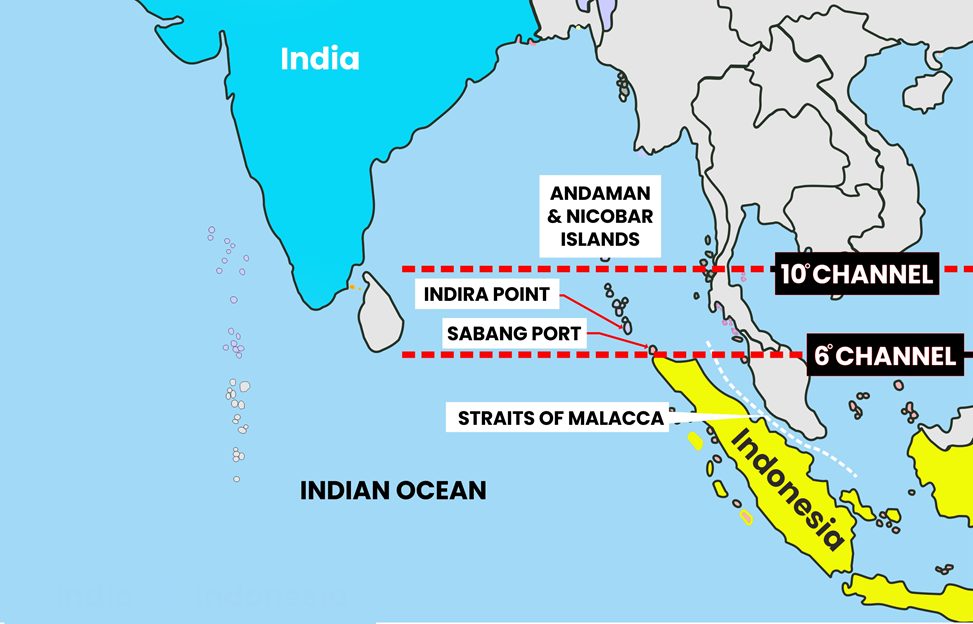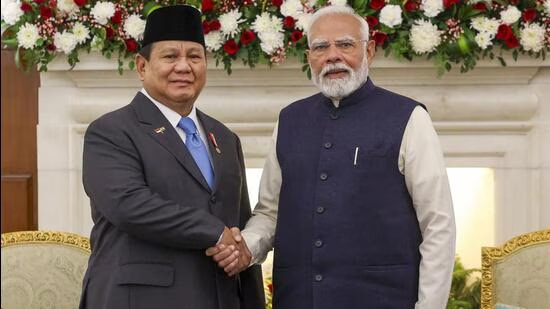India and Indonesia share deep-rooted civilizational, cultural, and geographical ties that have historically positioned them to develop a robust bilateral relationship. However, despite the potential for cooperation, this relationship has fluctuated over time, influenced by changing geopolitical contexts and leadership priorities. The recent state visit of Indonesian President Prabowo Subianto to India in January 2025 has provided a significant opportunity to further strengthen this partnership.
Historical Foundations of India-Indonesia Relations
- Anti-Colonial Support: India, under Prime Minister Jawaharlal Nehru, supported Indonesia’s independence movement against Dutch colonial forces. India took measures like banning Dutch airlines from Indian airspace and boycotting Dutch shipping, and also helped evacuate Indonesian leaders Sutan Sjahrir and Mohammad Hatta.
- Formal Diplomatic Relations: In 1950, Indonesian President Sukarno visited India, marking the start of formal relations. The 1951 Treaty of Friendship promoted “perpetual peace and unalterable friendship.” Both countries strongly aligned on non-alignment and anti-imperialism, highlighted by the Bandung Conference in 1955 and the creation of the Non-Aligned Movement (NAM) in 1961.
Divergence and Cooling Relations (1960s-1970s)
- Geopolitical Tensions: India’s growing concern over China after the 1962 Sino-Indian War clashed with Indonesia’s friendly relations with China. Indonesia sided with Pakistan during the 1965 India-Pakistan War, leading to further strain.
- Political Tensions: Sukarno’s radical foreign policies and tensions with Nehru led to a need for third-party mediation during the 1961 Belgrade Summit. Following a coup in Indonesia, General Suharto’s rise to power shifted Indonesia’s foreign policy towards the West, helping thaw relations with India.
The 1990s: A New Era of Engagement
- India’s “Look East” Policy: India’s economic liberalization and the collapse of the Soviet Union led to its "Look East" policy, strengthening ties with Southeast Asia. Indonesia, as a significant ASEAN member, became a key partner in this initiative.
- “Act East” Policy: In the early 2000s, India’s "Act East" policy further enhanced diplomatic, economic, and security cooperation with Indonesia.

Contemporary Relations: A Comprehensive Partnership
- Trade and Economic Cooperation:
Indonesia is India’s second-largest trading partner in ASEAN, with bilateral trade growing from $4.3 billion in 2005 to over $38 billion in 2023. Projections for 2023-24 are around $30 billion, with efforts to balance the trade deficit. - Defense and Security Cooperation:
Both nations focus on maritime security through joint military exercises and defense agreements. They are committed to a rules-based order in the Indo-Pacific, ensuring freedom of navigation amid China’s growing assertiveness. - Cultural and People-to-People Ties:
Cultural exchanges are growing, with 700,000 Indian tourists visiting Indonesia in 2023. The two countries aim to celebrate 2025 as the Indo-Asean Year of Tourism. India is also assisting in the conservation of Indonesia’s Hindu Prambanan and Buddhist Borobudur temples.
The 2025 State Visit: A Turning Point in Bilateral Relations
- Key Outcomes:
Indonesian President Prabowo Subianto’s state visit in January 2025, where he was the chief guest for India’s 76th Republic Day celebrations, marked a milestone. High-level discussions were held on defense, trade, and regional security, and five MOUs were signed, including one on maritime security cooperation. - Strengthening the Partnership:
President Subianto praised Indian leadership and emphasized deepening cooperation, particularly in economic ties and defense collaboration.
Key Areas of Cooperation
1. Defense and Security: Maritime security has emerged as a key area of collaboration, given the strategic importance of the Indo-Pacific region for both nations. India and Indonesia have conducted joint military exercises and are committed to enhancing their defense industry cooperation. Although no agreement on the sale of Brahmos missiles was reached during the visit, both countries expressed an intent to continue discussions on defense cooperation, focusing on supply chains and technological collaboration.
2. Economic Cooperation: The economic ties between India and Indonesia have grown steadily. With bilateral trade projected to reach $50 billion in the coming years, both nations are working to reduce bureaucratic obstacles and streamline regulations to facilitate trade. While India aims to increase exports to Indonesia, Indonesia has shown interest in Indian investments in sectors like infrastructure, healthcare, and digital transformation.
3. Cultural and People-to-People Ties: Cultural exchanges play a pivotal role in India-Indonesia relations. In 2023, around 700,000 Indian tourists visited Indonesia, with projections suggesting this number could rise to one million. The two countries have agreed to celebrate 2025 as the Indo-Asean Year of Tourism to further promote bilateral tourism. Additionally, India is assisting Indonesia with the conservation of the Hindu Prambanan Temple, a UNESCO World Heritage site, alongside ongoing work at the Buddhist Borobudur Temple.
4. Multilateral Cooperation: Both countries recognize the importance of multilateral forums like the G20, ASEAN, and BRICS, where they can collaborate to address common geopolitical challenges. The visit also underscored the growing trilateral cooperation between India, Indonesia, and Australia, aimed at ensuring regional security and stability.
The Future of India-Indonesia Relations
- Looking forward, the India-Indonesia partnership is set to grow even stronger, especially given the geopolitical shifts in the Indo-Pacific. Both countries are well-positioned to play a key role in ensuring peace, stability, and prosperity in the region. The creation of the Track 1.5 Dialogue mechanism during President Subianto’s visit will provide a platform for deeper engagement between political, business, and academic leaders from both countries.
- The future of their strategic partnership will depend on continued dialogue, particularly in defense, economic cooperation, and regional security. Both nations must also work towards realizing the full potential of their defense industrial cooperation, which remains an untapped area in their relationship.
Conclusion
India and Indonesia share a long and multifaceted history, marked by periods of both cooperation and divergence. Today, as both countries work to strengthen their ties in defense, trade, and cultural exchange, they are positioning themselves as key partners in the Indo-Pacific region. The strategic importance of their relationship cannot be overstated. The recent state visit of President Prabowo Subianto to India is a testament to the growing commitment on both sides to deepen bilateral cooperation. As India and Indonesia continue to navigate the complexities of global geopolitics, their enhanced partnership will have significant implications for regional peace, stability, and economic growth.
| Main Question: India and Indonesia’s relationship has been influenced by changing geopolitical dynamics, especially in the Indo-Pacific region. Discuss the role of India-Indonesia relations in the context of China’s growing assertiveness. |







